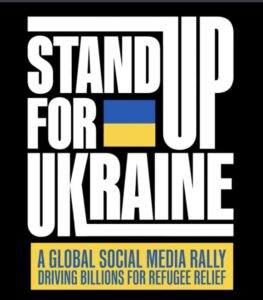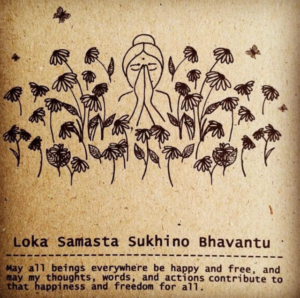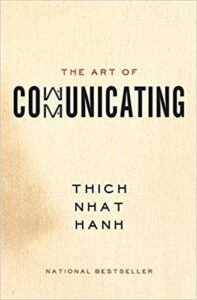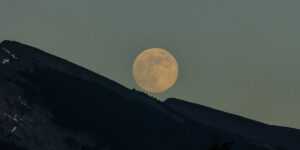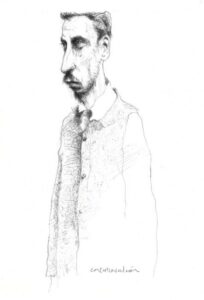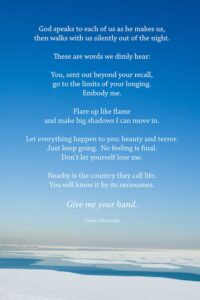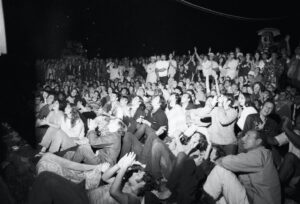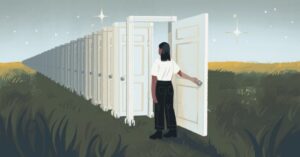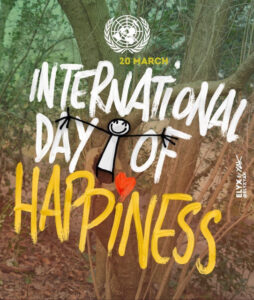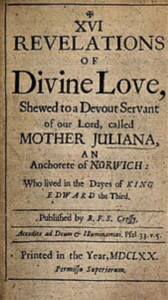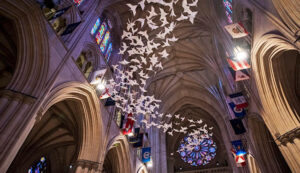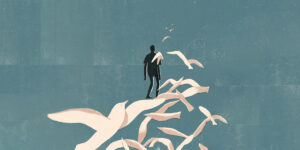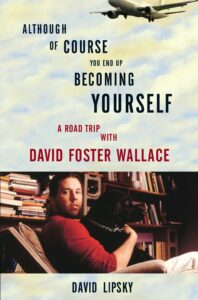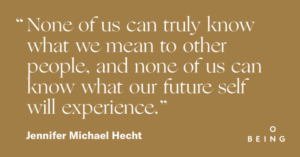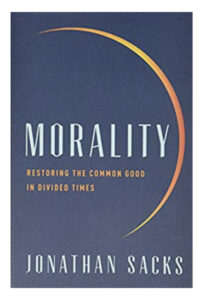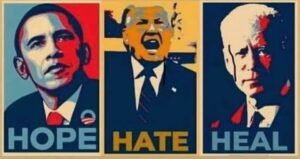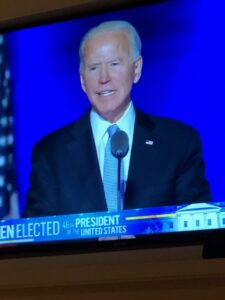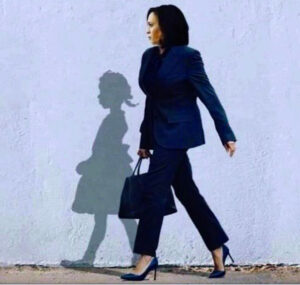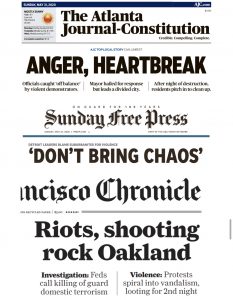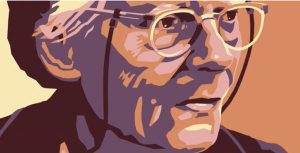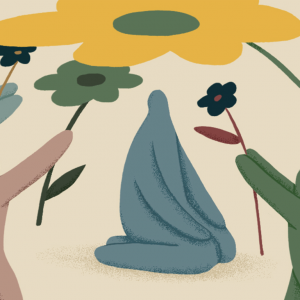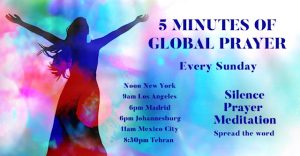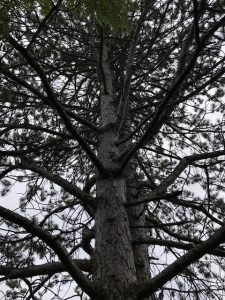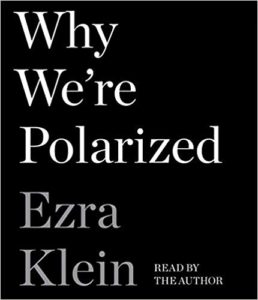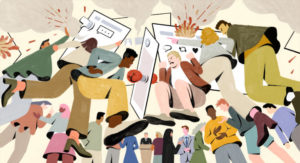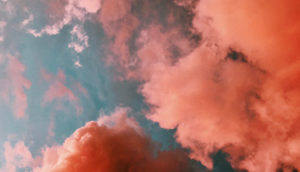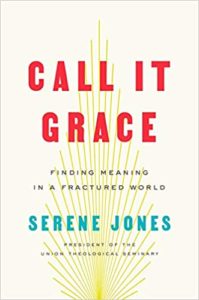Krista Tippett
🌻
April 2, 2022‘For never was a horror experienced without an angel stepping in from the opposite direction to witness it with me.’
-Rilke
This is an incredible time where the opportunity to bring in miracles and magic is strong.
Power comes from spirit and your essence and is fed and supported by the elements and energies more powerful than you such as the sun, the earth, nature, the stars, your imagination etc. You can be empowered or allow yourself to be disempowered through a trauma, karma or lessons, but another person cannot truly give or take away your power as they cannot ever truly give you any.
We have a tremendous opportunity to move through this and access the amazing landscape of love.
-Power Path
Krista Tippett reflecting on her time with poet and Pulitzer Prize winner Mary Oliver.
Life had moved forward, as it does. It was now composed of ingredients, as it always is, that neither she nor I would have been able to imagine.
‘We’re in yet another moment in the life of the world where we might unsee the beauty or imagine it overshadowed, defeated, or simply less powerful than what would steal it from us, blot it out. What a gift to re-summon Mary Oliver’s presence for this time. I hope you feel that, too.”
Listen.
From Global Citizen ⭕️
APRIL 8TH, 2022
Center for Action & Contemplation
‘Our fears offer us an invitation to engage with the discomfort of the inner places. Will you give your fear a chance to speak to you?
Ask, What is this trying to show me? or What else might be going on? Give yourself some time, and delve into the fear.’
Catastrophization
And it’s exhausting. Catastrophe fatigue sets in, and we end up losing interest and drifting away, until the next emergency arrives.
Catastrophization ends up distracting us from the long-term systemic work we signed up to do. It’s a signal that we care about what’s happening right now, but it also keeps us from focusing on what’s going to happen soon.
The best way to care is to persist in bending the culture and our systems to improve things over time.
-Seth Godin
January 26th, 2022
January 26, 2022‘Now I’m wondering: is there a way to disentangle the story from the information? Yes, we need to take care of ourselves and each other. Yes, we need to stay aware and intentional, particularly considering the most vulnerable among us. But is there a way to do it with less ego and more observing tenderness?
It turns out, the interpretation of life is relentless. The suspension of interpretation, while brief and groundless, can be a sweet relief. I want less ego-building exercises and more compassion experiments in my life moving forward. I want less roller coasters and more clouds. I want less fear and more love’ -Courtney Martin
Courtney E. Martin is an American feminist, author, speaker, and social and political activist.
Thich
Nhat
Hahn
The Four Elements of Right Speech
‘Loving, truthful speech can bring a lot of joy and peace to people. But producing loving speech takes practice because we aren’t used to it. When we hear so much speech that causes craving, insecurity, and anger, we get accustomed to speaking that way. Truthful, loving speech is something we need to train ourselves in.
In Buddhism there’s a practice called the Ten Bodhisattva Trainings. Four of these 10 relate to Right Speech. A bodhisattva is an enlightened being who has dedicated his or her life to alleviating the suffering of all living beings.
A bodhisattva is someone who can speak with gentle, loving speech and who can listen with compassion.
The four bodhisattva guidelines of the Ten Bodhisattva Trainings for Right Speech:
- Tell the truth. Don’t lie or turn truth upside down.
- Don’t exaggerate.
- Be consistent. This means no double-talk: speaking about something in one way to one person and in an opposite way to another for selfish or manipulative reasons.
- Use peaceful language. Don’t use insulting or violent words, cruel speech, verbal abuse, or condemnation.
When we don’t, repercussions are brutal and, sometimes, irreparable. -dayle
‘Our suffering has been trying to communicate with us, to let us know it is there, but we have spent a lot of time and energy ignoring it.
We know that the suffering inside us contains the suffering of our fathers, our mothers, and our ancestors.
Our suffering reflects the suffering of the world. Discrimination, exploitation, poverty, and fear cause a lot of suffering in those around us. Our suffering also reflects the suffering of others.
If we understand our own suffering it will become much easier for us to understand the suffering of others and the of the world.
But unless we can listen to and acknowledge our own suffering, we will not really be able to help.’
On Being.
Remembering Thich Nhat Hanh, Brother Thay
‘The Venerable Thich Nhat Hanh, revered Zen master, teacher, and poet, died on January 22, 2022, in his native Vietnam. Brother Thay, as he was known by his community and students, transmuted what he had experienced of chaos and bloodshed in his country and his life into an ability to speak with equal measures directness and compassion to the many conflicts and bewilderments of contemporary life. Martin Luther King Jr. nominated him for the Nobel Peace Prize. He was a great teacher of the wonderful practice of “walking meditation.” He taught a way of living to face suffering, fear, and violence inside and beyond ourselves and yet to become “fresh, solid, and free.” Krista sat with him for this rare conversation in the early years of this show, and it has touched many. It is astonishing to re-experience the deep, enduring wisdom this monk leaves for our world now.”
Host Krista Tippett.
2021’s end.
December 18, 2021♡
Rilke:
I have seen for some time
how everything changes.
There is that which arises and acts,
kills and causes grief.
[…]
Now it is empty where I stand
and look down the avenue.
Almost as far as the farthest ocean
I can see the heavy
forbidding sky.
Thomas Merton:
When God allows us to fall back into our own confusion of desires and judgments and temptations, we carry a scar over the place where that joy exulted for a moment in our hearts.
The scar burn us.
The sore would ache within us, and we remember that we have allen back into what we are no and are not yet allowed to remain where god would have us below.
We long for the place he had destined for us, and weep with desire for the time when his pure poverty will catch us and hold us in its liberty and never let us go, when we will never fall back from the Paradise of the simple and the little children into the forum of prudence, where the wise of this world go up and own in sorrow and set their traps for a happiness that cannot exit.
Krista Tippet.
On Being.
It remains such a hard, strange time in the life of the world. I cleave as best I can to my “muscular hope,” yet this past year has not lived up to the vision I had for the “beyond” of 2020. It was, I suppose, a dream of moving past the pandemic. Not a return to some old or new undesired “normal,” but at least a page turned, a new chapter opened. We are still, and again, in a liminal time and space — an in-between time of rupture and searching and unmourned losses and so many callings yet to heed, so much change to absorb and propel
Even as I am brokenhearted and uncertain at this juncture in the life of the world, I am ever grateful for the accompaniment you offer me in the mysterious, miraculous ether…
And I am, yes, looking forward to the beyond of this year. I will meet you here again on the other side. I wish you a restorative sacred holiday season, Christmastime, and New Year — and if that is not possible, as much kindness and gentleness toward yourself as you can possibly muster.

Be safe, friends. Mourn. Embrace. Love. Maybe even allow a little bit of hope. ~dayle
Hope is holding in creative tension everything that is with what could and should be, and every day taking some action to narrow the distance between the two. -Parker Palmer
Hope is a muscle.
September 20, 2021R
I
L
K
E
[Image: Artmajeur]
Let This Darkness Be a Bell Tower
Quiet friend who has come so far,
feel how your breathing makes more space around you.
Let this darkness be a bell tower
and you the bell. As you ring,
what batters you becomes your strength.
Move back and forth into the change.
What is it like, such intensity of pain?
If the drink is bitter, turn yourself to wine.
In this uncontainable night,
be the mystery at the crossroads of your senses,
the meaning discovered there.
And if the world has ceased to hear you,
say to the silent earth: I flow.
To the rushing water, speak: I am.
Sonnets to Orpheus II, 29
Widening Circles
I live my life in widening circles
that reach out across the world.
I may not complete this last one
but I give myself to it.
I circle around God, around the primordial tower.
I’ve been circling for thousands of years
and I still don’t know: am I a falcon,
a storm, or a great song?
“Alone, a bean is just a vine, squash an oversized leaf. Only when standing together with corn does a whole emerge which transcends the individual.”
-Robin Wall Kimmerer, Braiding Sweetgrass
“The brilliant host of On Being…”
July 20, 2021Inspired.
“We are apparently swimming in a reality unfolding moment by moment. The truly good news is that we are together. . . all forms of us.” -Pari Center, Italy, participant
Krista Tippett:
“We are living in a post 2020 world…for the rest of our lives.”
__
Anand Giridharadas is a journalist and writer. He is a former columnist and foreign correspondent for The New York Timesand a visiting scholar at the Arthur L. Carter Journalism Institute at New York University. He is the author of India Calling, The True American, and Winners Take All: The Elite Charade of Changing the World.
From Anand, 7.20.21:
“…got me thinking back to a conversation I once had with Krista Tippett, the brilliant host of On Being. And so today, on Billionaire Space Day No. 2, I share with you this brief reflection about the background ethos of the age…”
July 21, 1969, New York, New York: Rain-soaked New Yorkers watch TV and cheer as they see Apollo 11 astronaut Neil Armstrong’s first step on the lunar surface (Getty)
The.Ink
What we do alone and what we do together
On the billionaire space race
This is a story, in some ways, about two rival faiths. A faith in what we do alone versus a faith in what we do together.
These are two parallel and rival spiritual orientations. They are both very strong parts of our culture.
One tradition inspires the celebration of a heroic soloist, capitalist, pull-yourselves-up-by-the-bootstraps story.
But that’s never been the only story. We’ve also always had this story of movements. It wasn’t individuals who got rid of the King of England. The most important things we’ve done in this culture have been together.
These two tendencies, what we do alone and what we do together, have always vied for primacy in American life. For much of the 20th century, they lived in a certain healthy tension. And right now the relationship between them is very unhealthy. It’s become a relationship of mutual annihilation, instead of a relationship of adversarial cooperation.
I think we need to get back to a place where we understand both and celebrate both the very real heritage we have in this country of doing things alone and of doing things together, and the relationship that those things have.
Because at our best, we do things together in a way that allows people to do things alone. And people do things alone in a way that creates the opportunities to do things together. These things don’t have to be at war with each other, but they are absolutely at war today.
__
2018:
“This is a challenging conversation but a generative one: about the implicit moral equations behind a notion like “win-win” — and the moral compromises in a cultural consensus we’ve reached, without reflecting on it, about what and who can save us.’
We Americans revere the creation of wealth. Anand Giridharadas wants us to examine this and how it shapes our life together. This is a challenging conversation but a generative one: about the implicit moral equations behind a notion like “win-win” — and the moral compromises in a cultural consensus we’ve reached, without reflecting on it, about what and who can save us.” -On Being
From Krista Tippett on Twitter:
“…a lovely reflection, honored to be cited.”
Center for Action & Contemplation
June 27, 2021One of the goals that is emphasized in our culture is finding answers—solving problems, answering questions, removing doubt. We want to know who, what, when, where, and why—and we want to know now. When we listen, we are trained to listen for the answers. . . .
Reflective listening distinguishes a response from an answer. It is a practice to get to know your inner voice, and it takes time and patience.
“Not knowing what to do is the work for you now.” -Francesca
“Live the questions now. Perhaps you then may gradually, without noticing, one day in the future live into the answers.” -Rilke
[Image by Lily Qian, © All Rights Reserved.]
Joanna Macy and Anita Barrows
‘What a world you’ve got inside you.’
Make a cup of tea…and listen.
April 20, 2021Resmaa Menakem (MSW, LICSW, SEP) teaches workshops on Cultural Somatics for audiences of African Americans, European Americans, and police officers. He is also a therapist in private practice, and a senior fellow at The Meadows. His New York Times best-selling book is My Grandmother’s Hands: Racialized Trauma and the Pathway to Mending Our Hearts and Bodies.
Resmaa Menakem
‘Notice the Rage; Notice the Silence’
Across the past year, and now as the murder trial of Derek Chauvin unfolds with Minneapolis in fresh pain and turmoil, we return again to the grounding insights of Resmaa Menakem. He is a Minneapolis-based therapist and trauma specialist who activates the wisdom of elders, and very new science, about how all of us carry in our bodies the history and traumas behind everything we collapse into the word “race.” We offer up his intelligence on changing ourselves at a cellular level — practices towards the transformed reality most of us long to inhabit.
Host Krista Tippett:
‘Across the past year, and now as the murder trial of Derek Chauvin unfolds, with Minneapolis in fresh pain and turmoil, I return again and again to the grounding insights of Resmaa Menakem. He is a Minneapolis-based therapist and trauma specialist who activates the wisdom of elders, and very new science, about how all of us carry in our bodies the history and traumas behind everything we collapse into the word “race.” We offer up Resmaa’s intelligence anew on changing ourselves at a cellular level — practices towards the transformed reality I believe most of us long to inhabit.’
More from Krista:
‘Ever after, when I use the word “we” or “us,” I understand in a whole new way that I do so in a White body … I hold that knowledge together with my clarity that when time becomes history, the generations for whom we are the ancestors will see an “us.”’
‘…enough of us are preparing to be the generation, in bodies of every color, after so many generations of betrayal & blindness, to step onto that long arc of the moral universe—bending it towards justice & the Beloved Community.”
Menakem:
‘When we’re talking about trauma, when we’re talking about historical trauma, intergenerational trauma, persistent institutional trauma — and personal traumas, whether that be childhood, adolescence, or adulthood — those things, when they are left constricted, you begin to be shaped around the constriction. And it is wordless. Time decontextualizes trauma. So when my grandmother is saying that, I need to pay attention to that. And for her, it’s decontextualized, so she doesn’t even have a context for it.
Bodies of culture. That’s right. And so one of the things that happens with the vagal nerve — there’s two. There’s the vagal nerve — I call that the soul nerve — and then there’s a muscle, the psoas muscle. That psoas is a beast, because the psoas, what it does is, it connects the top part of the body with the bottom part of the body. It also — if you’re braced, it also manages whether or not you mobilize or immobilize. And if you’re born to people who are already braced, you pick up in your psoas this kind of locking down, this kind of bracing, decontextualized.
And so what I’ve been talking to people about is, how do we begin to get the reps in with those pieces? So you’re gonna need time to condition your body to be able to deal with the aches, deal with the doubt, deal with all of that difficulty. You’re gonna have to get up against your own suffering’s edge, before the transformation happens. But you need to condition that. Why do we think that when we talk about race, that’s any different — for me to say, “We’re gonna have a white body supremacy talk; deal with the root of this stuff”?’
Happiness…even now.
March 20, 2021💛 ❤️ 💛 ❤️ 🥰 ❤️ 💛 ❤️ 💛
And then, listen to Krista Tippett’s conversation with clinical psychologist Christine Runyan.
Runyan is a professor in the Department of Family Medicine and Community Health at the University of Massachusetts Medical School. She is a certified mindfulness teacher. She co-founded and co-leads Tend Health, a clinical consulting practice focused on the mental well-being of health care practitioners.
The light at the end of the COVID tunnel is tenuously appearing — yet many of us feel as exhausted as at any time in the past year. Memory problems; short fuses; fractured productivity; sudden drops into despair. We’re at once excited and unnerved by the prospect of life opening up again. Clinical psychologist Christine Runyan explains the physiological effects of a year of pandemic and social isolation — what’s happened at the level of stress response and nervous system, the literal mind-body connection. And she offers simple strategies to regain our fullest capacities for the world ahead.
This conversation is so practically helpful for understanding what’s been happening at a creaturely level inside us for over a year, and for gaining some simple strategies to bring our conscious selves back online, mustering the fullest capacities innate within us for meeting the world ahead.
Viktor Frankl, and he says, “Between stimulus and response, there is a space. And in that space lies our power to choose. And in our choice lies our growth and our freedom.”
In regard to the work Runyan does with health care workers and Tend Health:
“No amount of sophisticated technology can do what health professionals have done these past few months — offered care with uncertain evidence, sat with the dying, comforted family members from afar, held one another in fear and grief, celebrated unexpected recoveries, and simply showed up. We have asked and expected clinicians to show up in ways they were never trained to do. No one has been trained in how to emotionally manage months of mass casualties. No one has been trained on how to keep showing up despite feeling feckless on the job. No one has been trained how to keep regular life afloat at home and anxiety at bay, while working day after day with a little known biohazard.”
We are pretty conditioned to turn away from discomfort and suffering in our society. We are not very good at allowing for grief, which is always on its own timeline, and it’s unpredictable in its own right. And this is a tough one, because it’s not a pinpoint experience. I don’t know what it looks like to have a day of remembering or some sort of ritual around — because we’re still in it, is the other thing. We’re trying to grieve a trauma that is still ongoing. And I don’t have the answer to how to do that, other than one breath at a time — because it’s still here.
Whispers.
January 23, 2021“We may stumble, but always there is that Eternal Voice, forever whispering in our ear.”
-Science of Mind, p. 33
Eschatological secret [ultimate destiny of humanity]; wise heart…secret hope. -Thomas Merton
Revelations of Divine Love.
Lady Julian of Norwich.
‘Julian says that we have in us here such a “medley” of good and evil that sometimes we hardly know of others or of ourselves wherein we stand…’
-https://www.gutenberg.org/files/52958/52958-h/52958-h.htm
COVID
25,000,000 U.S. Cases
414,000 + deaths.
From Krista Tippet, Saturday, January 23, 2021
This week’s Pause is written by Krista:
Dear Friends,
I’ve been thinking this week about vocation — from the Latin vocare, callings. Somewhere along the way in this culture a person’s vocation became synonymous with their job title, but I think of vocation as the full range of our callings as human beings. Yes, as professional people but also as family members and neighbors, parents and friends, and members of a body politic. Vocation is not so much about goals and accomplishments. It’s about how we orient our lives and our attention and our passions. At different stages in life, different callings emerge and take primacy — what we focus on and pay homage to with our presence, and what we fight for from the ground of what we love.
To pick up the question of what is calling me and you is one way to begin to walk, each with our own offering, towards a new kind of wholeness in our life together. For there are callings in a time as in a life.
Some of us — many of us — are called right now primarily to get safe and fed and warm, to keep those we love safe and fed and warm. Some of us are called to place our bodies between other bodies and danger. Some of us are called to be bridge people, staking out the vast ground at the heart of our life together where there is meaningful difference but no desire for animosity.
And some of us are called to be calmers of fear. This calling is so tender, and so urgent, if what we truly want is to coax our own best selves, and the best selves of others, into the light. Fear is the primitive, powerful place our brains go when they perceive threat. It collapses imagination, closing down a sense of the possible. It looks for an “other” to blame, and it finds one. The anger that has consumed our life together on every side is fueled by pain and fear.
This is an uncomfortable truth to take in, a fact not about life as we wish it to be but about life as it is. One of the most painful things for me to watch in the frenzy of our life together in recent years was the loss of any capacity to remember that essential contradictions run wild in each of us and are real, too, in whoever our “others” have become. There is a terrible but also a beautiful, and potentially redemptive, complexity at play whenever human beings are involved.
I wonder if now, more of us who are safe enough might feel ourselves called — to invoke Bryan Stevenson — to walk towards the reality that those who confuse and vex us are more than the worst thing we believe they are or have done. We might be called — to invoke an image Frances Kissling once gave me that has shaped my sense of calling ever since — to populate and build up “that crack in the middle where people on both sides absolutely refuse to see each other as evil.” We spend so much time and energy in this culture, so much fierce creativity, wishing to change other people’s minds. But in life as it is lived, we know that’s not how it works. Hearts soften, and then minds open. Pragmatic possibilities appear that our bodies and brains literally could not fathom before.
The show we’re offering up this week is another kind of nod to our complexity — and to how hard a time we continue to inhabit. Even as I write this with passion I feel my body clenching, exhausted by the idea of greater callings. On some level, I’m just trying to get through the days. Katherine May, who I learned about when I asked people on Twitter what was helping them get through their days, reminds me that heeding my clenching and exhaustion is also part of the way forward. She meditatively explores “wintering” as a season of the natural world but also as a place our bodies and psyches need to go, a season that recurs again and again across a life. We cheat and dismiss this in life as we’ve been living it, but it has presented itself insistently in a pandemic year we might reimagine as one long communal wintering.
We can’t move forward without grieving all we’ve lost in the past year. Closer to the ground, this means we have to let in the fact of sadness — a precursor to pain and fear — with some reverence. If happiness is a skill, Katherine May says, so is unhappiness. Winter embodies the strange complexity of reality. It is the bitterest season, we blithely say. And all the while it manages not to be the death of the life cycle, as Katherine May reminds, but its crucible.
Katherine May helps me, and I hope she offers some restorative grace to you.
Krista
Rev. Dr. Barbara Holmes, Center for Action & Contemplation:
…the American dream of freedom and equality could be made real through courageous action in a spirit of love, in pursuit of human dignity for all. This dignity includes all who suffer from homelessness, joblessness, purposelessness, carelessness, hopelessness.
Because our needs are so great today, and your care so constant, we know that you are rebuilding the network of compassion around new visionaries who you have assembled for this hour. Surprise us with the discovery of how much power we have to make a difference in our day:
—A difference in the way citizens meet, greet, respect, and protect the rights of each other.
—A difference in the breadth of our vision of what is possible in humanization, reconciliation, and equalization of results in our great city.
—A difference in the way government, business, and labor can work together, for justice and social enrichment.’
https://www.youtube.com/watch?v=kceBOoQxEA8&feature=youtu.be
‘…under her sky.’
January 16, 2021Washington National Cathedral is hosting a new art exhibit showcasing thousands of paper doves suspended from the Cathedral’s vaulted, 100-foot-high ceiling through May 2021. The “Les Colombes” exhibit is by German artist Michael Pendry, who has created similar works at Cathedrals around the world, and symbolizes the Biblical theme of hope and optimism heading into the new year after a very challenging 2020.
Every moment and every event of every woman’s life on earth plants something in her soul. -Thomas Merton [changes to gender, mine.]
More from Merton:
Prayer is freedom and affirmation growing out of nothingness into love. It is the elevation of our limited freedom into the infinite freedom of the divine spirit and of the divine love. Prayer is an emergence into this area of infinite freedom.
~
Keep your eyes clean your ears quiet and your mind serene. Breathe Gaia’s air. Work, if you can, under her sky.
Dear Friends,
I’ve always called myself a lover of language and of the limits of language. But this week I take no pleasure in how tongue-tied I feel, standing before the disarray and fragility of our life together. It’s hard to put words out into the world right now for so many reasons. That they’re not big enough. That they never tell the whole truth. That we live in a moment so on edge and reactive that someone will take offense, or be wounded by my words, and that feels harder than ever before to risk and to bear.
There is an insanity to our life together right now that is directly related to the tenuous hold on sanity so many of us feel after surviving this past year.
That does not justify hatred or violence.
It does mean that we’re called to be as gentle with ourselves and others as we can possibly, reasonably muster. That sounds like such a modest contribution to the tumult all around and on our screens, but it is not.
I keep coming back in memory, and feeling in my body, to my experience of election night 2020. I observed it as someone who sees our political life together as a reflection of the human condition in all its complexity, contradiction, and mess. But I was also watching as a person who grew up in one of the “reddest” states, who now lives in one of the “bluest.” I felt a panicked sadness — this has remained my primary emotion through everything that has followed — as the cameras zoomed in and out on those maps of our country.
I saw visually what I know in life as it is lived: those maps marked up with definitive reds and blues don’t tell the truth of our alienation and its unsustainable intimacy. The fractures that actually define our nation right now do not run state to state or county to county, but neighborhood to neighborhood, family to family. They run through our dreams for our children on every side. They run through our hearts, and through our lives.
I am so grateful to have received, as I was struggling to write this, an email from Whitney Kimball Coe of the Rural Assembly and the Center for Rural Strategies. There is a whole epic story of our time in what is being gathered and created in the world she’s part of. It is in no way described or contained in a red-blue demographic lens of the “urban-rural divide.” She gave me permission to share this part of her email with you:
“I’m at home nursing my youngest, Susannah, who had a scary fall on Monday night and is now recuperating from surgery. She’s going to be fine, but my goodness, 2021 came in hard. Stream of consciousness moment:You know, our hospital experience put us directly in the path of so many wonderful East Tennesseans. Nurses and technicians and doctors, the other parents waiting in the ER, the parking attendant, the security guard. I’m sure many of them didn’t vote as I did in the last election and probably believe the events of Jan 6 were mere protests, but they responded to our trauma with their full humanity. I’d forgotten what it feels like to really see people beyond their tribe/ideology. It broke something open in me. I’ve been living in a castle of isolation these many months and it’s rotted and blotted my insides. I’m aware of contempt, anger, and maybe even paranoia coursing through my veins, and I wonder if that’s just a snippet of where we are as a nation.
Why is our righteous indignation and disgust so much easier to flame than our compassion?
It makes me realize that there is no substitute for coming into the presence of one another. No meme nor Twitter post nor op-ed nor breaking news nor TED talk can soften and strengthen our hearts like actually tending to one another. We don’t have to ignore/excuse the darkness we all carry, but we have to keep showing up so we don’t lose ourselves to bitterness.”
We cannot conjure up something so aspirational as “unity” by wishing it, and we are in fact impoverished when it comes to “common ground” between our societal trenches.
But if I’ve heard one thing most insistently, with an infinite variety of circumstance and struggle, from absolutely every beautiful and wise human I’ve ever met, it is this: We are creatures made, again and again, by what would break us. Yet only if we open to the fullness of the reality of what goes wrong for us, and walk ourselves with and through it, are we able to integrate it into a new kind of wholeness on the other side.
Our collective need for a new kind of wholeness might be the only aspiration we can share across all of our chasms right now.
Longings, too, can be common ground. A shared desire not to be lost to bitterness. A clear-eyed commitment that what divides us now does not have to define what can become possible between us. Questions, honestly asked, about how to make that real.
-Krista
[Krista Tippett is a Peabody Award-winning broadcaster, a National Humanities Medalist, a New York Times bestselling author, and founder of On Being.]
Believing into being.
December 18, 2020‘Suicide is such a powerful end; it reaches back and scrambles the beginning. It has an event gravity: eventually, every memory and impression gets tugged in that direction.’ -David Lipsky
On Being
Jennifer Michael Hecht on suicide, and how we believe each other into being:
‘We believe each other into being.’
That’s the message the philosopher, poet, and historian, Jennifer Michael Hecht, puts at the center of her unusual writing about suicide. She’s traced how Western civilization has, at times, demonized those who died by suicide, and, at times, celebrated it as a moral freedom. She has struggled with suicidal places in her life and lost friends to it. She proposes a new cultural understanding based on our essential need for each other.
“God is setting us a big challenge.”
November 14, 2020A celebrated moral thinker and renowned Judaic intellect, Rabbi Jonathan Sacks died last week at 72 from cancer.
“The greatest single antidote to violence is conversation, speaking our fears, listening to the fears of other—in that sharing of vulnerabilities, discovering a genesis of hope.”
When Krista Tippett, On Being, spoke with Lord Sacks in 2010, he modeled a life-giving, imagination-opening faithfulness to what some might see as contradictory callings: How to be true to one’s own convictions while also honoring the sacred and civilizational calling to shared life — indeed, to love the stranger?
Krista: You’ve made a statement. I think it’s audacious: “The greatest single antidote to violence is conversation, speaking our fears, listening to the fears of others, and in that sharing of vulnerabilities, discovering a genesis of hope.” Now as someone who conducts conversation for a living, I love that statement. I wonder how you know that to be true — that the antidote to violence is conversation.
Lord Sacks: Listening gives each of the two parties the feeling that they are heard, and once they’re heard, they can then begin to speak what they really feel. And then they can begin to realize that there are things they still care about in common.
Sometimes I think what would happen if we generated real conversations at the grassroots level between the people whose lives are really affected?
The real conflicts arise when our minds are focused on the past.
I think God is setting us a big challenge, a really big challenge. We are living so close to difference with such powers of destruction that he’s really giving us very little choice. You know, to quote that great line from W.H. Auden, “We must love one another or die.”
So I am full of hope as we face the greatest challenge humanity ever has.
Heal. And unite.
November 8, 2020
🤎 I love this image, especially because not only does he embody hate, I am reminded hate is born of fear and fragmentation, threading in and out of our existence on this plane. Somehow, we, this country, allowed him to be celebrated after decades of his darkness…his evil energy. May he always be a reminder for what we don’t want to be and stay diligent against these dark forces. May he be dissolved, and fade from our public platforms and consciousness. May those who supported him be awakened to his destructive energies and dark heart. May their eyes be opened. And may they want to unite with all of us to be one people, to know what is true, justified, equal…for all beings…especially the oppressed and marginalized. Let us, together, be reminded of what it means to reside in the heart of democracy and fix what has been broken since this country was born.
And then, may we heal.
-dayle
From Joe Biden, the 46th President of the United States:
“For all those of you who voted for President Trump, I understand the disappointment tonight. I’ve lost a couple of times myself. But now, let’s give each other a chance. It’s time to put away the harsh rhetoric, lower the temperature, see each other again, listen to each other again. And to make progress we have to stop treating our opponents as enemies.”
Alluding to scripture, he added: “This is the time to heal in America.”
From the Vice-President Elect, Kamala Harris, the first woman, a woman of color, Black and Southern Asian woman, to be elected to this office.
“Protecting our democracy takes struggle. It takes sacrifice. But there is joy in it. And there is progress. Because we, the people, have the power to build a better future.”
We The People
For those who voted, again, for the current president, please answer, ‘Why’? What did he do for you? During a pandemic? Employment? Opportunity? Fairness? Equality? Or, is it deeper? Fear? Nationalism? Culture? Bias? Concerns over race? Majorities? Disinformation? Social media platforms?
- Truth.
- Faith.
- Clarity.
- Compassion.
- Empathy.
May we heal. And unite. Not half of us…all of us. We. The. People.
W.E.B. Du Bois:
Strive for that greatness of spirit that measure life not by its disappointments, but by its possibilities.
Desmond Tutu:
My humanity is bound up in yours, for we can only be human together.
The collective heart of humankind’s suffering.
Thomas Merton:
The whole idea of compassion is based on a keen awareness of the interdependence of all these living beings, which are all part of one another and all involved in one another.
Friends,
Today, we celebrate our democracy, our common humanity, and a glass ceiling shattered once and for all.
With nearly 160 million votes cast, Joe Biden and Kamala Harris have won a decisive victory. They received more than 75 million votes, a greater number than any ticket in history, with a remarkable breadth of support from across the nation.
And they shattered several glass ceilings—it will be a joy to watch Vice President-elect Kamala inspire generations of future leaders and active citizens!
Across the Collective, we have seen so many give so much over these past four years, using a range of tools to fight for justice, equality, and our democracy. I am thankful and full of admiration.
We now have the opportunity to work for the systemic solutions we know we need—solutions that can remake the calcified systems in our country, from immigration and education to race and reconciliation, criminal justice and climate. And it will require each of us to bring spirit of ingenuity and hard work to support and accelerate America’s rebuilding and renewal.
We will let out the breath we have been holding in for so long. As celebratory as we feel, we also know that much work lies ahead—the work of healing the wounds and repairing the breaches.
So, we will get to work, and usher in the America we know is possible.
With relief and gratitude,
Laurene, Emerson Collective
Empathy + Sympahty = Compassion
We are a progressive being.
There is nothing at a standstill in nature.
Only God is motionless for (S)He was, is and will be the same yesterday,
today and tomorrow,
and yet, is ever moving.
-Mahatma Gandhi
I will never understand how 70,000,000+ people could vote for him again. Never. Perhaps, maybe, hopefully, some will evolve to understand his destructive and immoral behaviors. He has shown us who he is for decades. Some of us (me) gave him no mind. And then, he was elected to serve. He did not serve. He lied. He divided. And he hated. Hate is born of fear. What was feared?
Perhaps, we have always been this divided, but the ugly part was given platform and verbalized. Democracy, we have learned, is not passive, but active. We can not simply turn out the vote every two, or four years.
We must edify and protect the marginalized and oppressed. The government serves us, we don’t serve it.
A true democracy is messy and necessary. And it requires ‘good trouble.’
Now, let’s work to balance the scales and bring Jon Ossoff and Rev. Raphael Warnock to the U.S. Senate in Georgia. The shadow president, Senator Mitch McConnell, will continue to strangle democracy and refuse to move policy forward if we do not achieve balance. Please donate or volunteer:
electjon.com warnockforgeorgia.com
James Martin, SJ:
It is, and always has been, possible to speak respectfully about someone with whom you disagree. Here’s how: “Though we have political differences, I know Joe Biden to be a good man who has won his opportunity to lead and unify our country.”
Krista Tippett, journalist and author:
What is the story of “us”? How do we learn it, how do we tell it, and how to shift it, across dehumanizing divides, in enduring ways?
Padraig O’ Tuama, poet:
In all the waiting of your week — for results from elections, for different news, for finality, for certitude — the work of the past is calling for attention. A new future will only be built on courageous moments, and those are happening now, and now and now. In the waiting, we are with you, considering history, paradise and conflict, considering how these patterns of time are inviting us to new actions.
U
N
I
T
E
On Being:
What do you notice about how you behave in times of conflict? Do you tend toward avoidance? Or compromise? Or collaboration? Or competition? Or accommodation?
This poem describes a conflict between neighbors: a tree hangs over a fence. The owners love this tree; their neighbors don’t. Somebody responds directly, somebody else avoids, a chainsaw appears. Suddenly this conflict becomes a parable for all conflicts, illustrating how deep they can go and how often they cannot be resolved with a question about what to do.
‘Conflict is not two sides, but many sides.
What is the definition of love between conflict?’
Will we learn how to listen to each other again; we are not enemies–we are merely opponents. We have more in common than we know, or perhaps, are willing to admit. .d
If not now, when?
May 31, 2020‘Apocalypse (ἀποκάλυψις) is a Greek word meaning “revelation”, an unveiling or unfolding of things not previously known and which could not be known apart from the unveiling.’
‘Our nerves, our home, our country crave peace’…and leaders. As the helpers and heroes sustain us, I pray for shift. -dayle
Now, I have no choice but to see with your eyes,
so I am not alone,
so you are not alone.
-Yannis Ritsos
Mark Nepo:
There is a story of Gandhi that reveals how profound and daring his sense of compassion was. It occurred during one of his famous hunger strikes. A man whose daughter was killed came in anguish, saying to Gandhi that he would stop fighting if the great soul would eat. But Ghandi knew the healing was deeper than just stopping the violence, and so he told the man he would eat only when the tormented father embraced the man who killed his daughter.
It is said that the man collapsed in tears, but did as Gandhi asked, and the larger conflict ended. This is an enormous thing to ask of someone in grief, of someone who has been violated. But beyond the vast courage needed to incorporate this kind of love into our daily lives, Gandhi’s request reveals the irrefutable wisdom that only when the broken are headed, no matter what they have done, will we as a people heal.
-The Book of Awakening, p. 179.
Image credit: Dorothy Day, by Julie Lonneman.
’So what makes a good community? Our very survival as a faith tradition, not to mention a species, might just depend upon this.’
Common Ground & Purpose
People want something more from church than membership. They long for a spiritual home that connects with their whole life, not just somewhere to go on Sunday morning. Church is meant to be a place that nurtures and supports individuals along their full journey toward the ultimate goal: a lived experience of the communion of saints, a shared life together as one family, the Reign of God “on earth as it is in heaven” (Matthew 6:10).
Too often, the formal church has been unable to create any authentic practical community, especially over the last half-century. In response, we see the emergence of new faith communities seeking to return to this foundational definition of church. These may not look like our versions of traditional “church,” but they often exemplify the kinds of actual community that Jesus, Paul, and early Christians envisioned. People are gathering digitally and in person today through neighborhood associations, study groups, community gardens, social services, and volunteer groups. They’re seeking creative ways of coming together, nurturing connection, of healing and whole-making. The “invisible” church might be doing this just as much, if not more, than the visible one. The Holy Spirit is humble and seems to work best anonymously. I suspect that is why the Holy Spirit is often pictured as a simple bird or blowing wind that is here one minute and seemingly gone and then nowhere (John 3:8).
It’s all too easy to project unrealistic expectations on any community. No group can meet all our needs as individuals for emotional, mental, and physical well-being. The human psyche needs space and healthy boundaries and not co-dependent groupings. I certainly learned this lesson myself through my participation in the New Jerusalem Community in Cincinnati in the 1970s and 80s, and even earlier as a Franciscan brother. Almost any community can serve as an excellent school for growth, character, and conversion, even though it may not be a permanent “home” for many reasons.
Remember, the isolated individual is fragile and largely helpless to evoke long-term change or renewal. By ourselves, we can accomplish very little. We must find common ground and common purpose to move forward. Fr. Richard Rohr
‘We wake to our cities in pain but also in longing. Full of far more people ready to build & create than to tear apart. On Lake St in Minn yesterday I saw what the drones & news cameras do not convey – an alternative landscape of care rising up around devastation.’ -Krista Tippet, On Being
The NASA/SpaceX launch and ISS dock has brought needed respite, inspiration, and hope. Look what we can accomplish as a species when we work together. -dayle
Let us surrender to Divine Grace.
-Rev. Dr. David Ault
Global Prayer & Meditation
April 25, 2020
I have come to the surprised conclusion, after being raised on an idea of body/mind/spirit as distinct, that the distinctions were borne of the limits of our understanding. We all know, in ways terrible and wonderful, that what touches your body deeply also touches your spirit. -Krista Tippett
ℒℴve❥❥☆҉
James Parker’s prayer for these trying times.
Dear Lord,
In this our hour of doorknobs and droplets,
when masks have canceled our personalities;
in this our hour of prickling perimeters, sinister surfaces,
defeated bodies, and victorious abstractions,
when some of us are stepping into rooms humid with contagion,
and some of us are standing in the pasta aisle;
in this our hour of vacant parks and boarded-up hoops,
when we miss the sky-high roar of the city
and hear instead the tarp that flaps on the unfinished roof,
the squirrel giving his hingelike cry, and the siren constantly passing,
to You we send up our prayer, as follows:
Let not heebie-jeebies become our religion,
our new ideology, with its own jargon.
Fortify us, Lord. Show us how.
What would your saints be doing now?
Saint Francis, he was a fan of the human.
He’d be rolling naked on Boston Common.
He’d be sharing a bottle. No mask, no gloves,
shielded only by burning love.
But I don’t think we’re in the mood
for feats of antic beatitude.
In New York City, and in Madrid,
the saints maintain the rumbling grid.
Bless the mailman, and equally bless
the bus driver, vector of steadfastness.
Protect the bravest, the best we’ve got.
Protect the rest of us, why not.
And if the virus that took John Prine
comes, as it may, for me and mine,
although we’ve mostly stayed indoors,
well—then, as ever, we’re all Yours.Until further notice,
AMEN
Even though I’ve said this at other times, it’s so important that I repeat it here: it is that souls shouldn’t be thinking about consolations at this beginning stage. It would be a very poor way to start building so precious and great an edifice. –Teresa of Ávila
Under no circumstances, said Teresa, are we to give up our time of prayer and meditation, no matter how tedious it becomes; this would be like saying that since we are no longer receiving anything, we will not spend our time this way. Can you imagine acting like this with our friends and lovers? What if, in a moment of not receiving anything from them, we ceased spending time with them?
The small amount of time we do spend in prayer and meditation, Teresa believed, should be given wholly to the Beloved—we should consider it not ours but the Beloved’s.
Our hearts open either because they have been softened, or perhaps because suffering makes us feel like we have nothing more to lose. It often takes us to the edge of our inner resources where we “fall into the hands of the living God”(Hebrews 10:31).
[Fr. Richard Rohr/Center for Action & Contemplation]
onbeing.org
April 20, 2020‘If you don’t shed a tear while you’re here,
you will have missed the point.”
I allow myself to e grounded in the experience of this peace, this beauty this goodness that avails itself to each of us now.
I am aware that we are all a center of divine consciousness in this vast whole.
This Presence invites each of us to co-reate a world that is just, equitable and sustainable of all life-a world that works for all creation.
And so even now, as light has given way to darkness, we remember that one again light is born from darkness.
I remember to be grateful for the light to emerge once again.
-Science of Mind
?
April 18, 2020St. Salvayre, France
Wendell Berry’s poem, “The Peace of Wild Things”
“When despair for the world grows in me
and I wake in the night at the least sound
in fear of what my life and my children’s lives may be,
I go and lie down where the wood drake
rests in his beauty on the water, and the great heron feeds.
I come into the peace of wild things …”
Practice: Forest Bathing
Center for Action & Contemplation:
“The art of healing comes from nature, not from the physician.” –Paracelsus
Recently, in reference to concerns about COVID-19, I said, “Love always means going beyond yourself to otherness.” African American mystic Howard Thurman understood this deeply through a connection with nature which provided him with “a certain overriding immunity against the pains in life.” [3] In his youth he found solace in a relationship with a tree near his home. He writes:
Eventually I discovered that the oak tree and I had a unique relationship. I could sit, my back against its trunk, and feel the same peace that would come to me in my bed at night. I could reach down into the quiet places of my spirit, take out my bruises and joys, unfold them and talk about them. I could talk aloud to the oak tree and know that I was understood. It too, was part of my reality, like the woods . . . giving me space.
-Howard Thurman
During this time of social distancing from other humans, it is still possible for some of us to practice “ecotherapy” or in Japanese, Shinrin-yoku—refreshment and healing by walking or resting where there are trees or forests. For those who don’t have access to nature currently, I hope you will have an opportunity soon. I also have a feeling we will all have a newfound appreciation for the outdoors when this time of “sheltering in” is over. From M. Amos Clifford’s book Your Guide to Forest Bathing:
The invitation is simple: Walk slowly [or sit still], while silently noticing what is in motion in the forest. There is always movement, even when things seem perfectly still. Strands of a web drift in the air, trees move in the breezes, birds fly by, and squirrels scramble in the branches, grasses bend, insects crawl. . . .
Until you become accustomed to it, walking slowly for more than a few minutes is, paradoxically, stressful. . . . Because the mind and body are a single entity, slowing our body will also calm our mind. . . .
The eternal movement of the forest gives our minds something to engage with. Just as with sitting meditation the breath is always there and available for watching, in the forest there are always things in motion. Your mind will drift, and many other thoughts will arise. When they do, gently bring your attention back to noticing what’s in motion.
When you find you have automatically sped up, come to a complete halt for a moment. It’s an opportunity to fully give your attention to one thing, noticing how that thing is in motion. After a brief pause you’ll be ready to continue your slow walk.
I recommend that you walk like this for at least 15 minutes. That’s enough time for your mind to go through several cycles of distraction and calming. [5]
M. Amos Clifford, Your Guide to Forest Bathing: Experience the Healing Power of Nature (Conari Press: 2018), 34–35.
Ecological philosopher Joanna Macy understands: “Our difficulty in looking at what we’re doing to our world stems not from callous indifference or ignorance so much as it stems from fear of pain,” she says.
It is largely after the fact that faith is formed—and gloriously transmuted into hope for the future. Only after the fact can you see that you were being held and led during the fact.
-Richard Rohr
You say one love, one life (One life)
It’s one need in the night
One love (one love), get to share it
Leaves you darling, if you don’t care for it. U2
Living the Questions
On Being host Krista Tippett reflects on this moment as one of collective transition and ponders what we might integrate into the people we become on the other side of it.
Living the Questions: How can I find my footing in a shifting world?
To a question from listener Colorado Springs, Krista reflects on seeing this as a collective moment of transition (which is always stressful in human life) and ponders what we might integrate into the people we become on the other side of it. “To really, actively, accompany each other in holding that question — that might be a spiritual calling but also a civilizational calling for this very extraordinary transition,” she says.
❧
Ever again, though we've learned the landscape of love and the lament in the churchyard's names and the terrible, silent abyss where the others have fallen; ever again we walk out, two together, under the ancient trees, ever again find a place among wildflowers, under heaven's gaze. -Rilke, Uncollected Poems
We need you.
April 1, 2020“The world we want to make when we get out of this.”
-Krista Tippett, On Being
Who’s in?
“A dysfunctional whole.”
February 11, 2020“The American political system—which includes everyone from voters to journalists to the president—is full of rational actors making rational decisions given the incentives they face,” writes political analyst Ezra Klein. “We are a collection of functional parts whose efforts combine into a dysfunctional whole.”
He traces the feedback loops between polarized political identities and polarized political institutions that are driving our system toward crisis.
#MustListen
Three podcasts:
- On Being with Krista Tippett
- Why Is This Happening with Chris Hayes
- Ezra Klein Show interviewed by historian Jill Lepore
[If you can only listen to one, please choose On Being with Krista Tippett. Beyond the exemplary content, it’s worth noting the calm Krista brings to Ezra’s atypical tempo. She is seemingly able to, through conversation, slow his often rapid delivery allowing reflection, pause and spiritual insight.]
Ezra Klein — How We Walked Into This and How We Can Walk Out
Journalist Ezra Klein has been widely interviewed about his new book, Why We’re Polarized. In this conversation, he’s frank and reflective about what’s at stake in human terms in this political moment. And he describes how we all — Democrat and Republican, journalist and citizen alike — walked into this as a way to trace our steps out of it.
What are the structures that shape people’s decision-making? What are the structures that lead us to be who we are? I think that we often have an illusion that we made a choice for ourselves, when that choice was so fundamentally shaped by who we are and where we grew up and what was around us and what made sense for us to do, that in some final accounting, it was really almost never a choice at all. And I think when you look at the world like that, then it becomes very, very deeply important — it becomes of central importance — that those systems are just and that, in some big way, we are helping people who were born into, or who fell into, the wrong systems.
one of the really radicalizing things for me in the past couple of years has been this question, and it came a lot from my political reporting and talking to members of Congress and watching other journalists and starting Vox, of just: Have we built a system that has structured itself such that it is, at the very least, very hard for people to express the best versions of themselves within it? And I think we have.
I talk about this interview I did with President Obama, in the book. And I talked to him about polarization, and he’s somebody — I interviewed him many times, and I have great admiration for him. And he’s somebody who, I think, in a very deep way, believed that America could overcome its polarization, believed that a lot of that polarization was illusory. And I asked him about it, because at that point in 2015, when we had this discussion, he was quite polarizing. And I asked him about this. And he said, well, look: We all know that we’re one way in politics, but then, when we’re on the soccer or the little league field together, or we’re at the PTA meeting, or we’re talking to our neighbors, or there’s been a storm, we’re very different than that. And so, yeah, then, maybe, when you talk to that person about politics, you can’t believe what they’re saying, but then you look beyond that, and they’re good people. This country is full of good people.
In the past couple of years — and it was actually at the recommendation of Varshini Prakash, who is the executive director of the Sunrise Movement, the climate change movement — I had a conversation with her on my show, and I asked her, what does she do when she thinks about failure? And she said that every day she reads some of the Tao, the Tao Te Ching. And I thought, that’s a strange answer. And so I went, and I had not read it since I was young, when I didn’t get anything out of it.
And this time when I read it, I was really, really, deeply struck by its ideas of non-dualism, its challenge to think about everything is also encoding its opposite. And so much of how we are taught to think — I just think in general, but very much in politics — is, things are one way. They are right, or they are wrong. We got it right, or we got it wrong. This person won, and this person lost. It’s a clean equation that has one answer, every single time. And the deep truth about the Obama presidency is that the DT presidency was within it …
Krista:
And this time when I read it, I was really, really, deeply struck by its ideas of non-dualism, its challenge to think about everything is also encoding its opposite. And so much of how we are taught to think — I just think in general, but very much in politics — is, things are one way. They are right, or they are wrong. We got it right, or we got it wrong. This person won, and this person lost. It’s a clean equation that has one answer, every single time. And the deep truth about the Obama presidency is that the DT presidency was within it …
Chris Hayes:
The title says it all on this one, folks. What is it about the American political system that cultivated this deeply dysfunctional and polarized climate? Last year, we had Ezra Klein on the show to assess how bad things were in the Trump era (conclusion: not great). Now, Klein is back to discuss his new book “Why We’re Polarized” which provides a systematic look at the deep structural defects in American democracy that are manifesting themselves in two coalitions that are increasingly at each other’s throats.
Ezra Klein:
Jill Lepore on what I got wrong.
Jill Lepore is a Harvard historian, a New Yorker contributor, the author of These Truths, and one of my favorite past guests on this show. But in this episode, the tables are turned: I’m in the hot seat, and Lepore has some questions. Hard ones.
This is, easily, the toughest interview on my book so far. Lepore isn’t quibbling over my solutions or pointing out a contrary study — what she challenges are the premises, epistemology, and meta-structure that form the foundation of my book, and much of my work. Her question, in short, is: What if social science itself is too crude to be a useful way of understanding the political world?
But that’s what makes this conversation great. We discuss whether all political science research on polarization might be completely wrong, why (and whether) my book is devoid of individual or institutional “villains,” and whether I am morally obliged to delete my Twitter account, in addition to the missing party in American politics, why I mistrust historical narratives, media polarization, and much more.
This is, on one level, a conversation about Why We’re Polarized. But on a deeper level, it’s about different modes of knowledge and whether we can trust them.
https://podcasts.apple.com/us/podcast/jill-lepore-on-what-i-get-wrong/id1081584611?i=1000464782668
On Being
December 8, 2019The Pause
Loving the Questions
In 1974, a 15-year-old Serene Jones sat at a campfire sing-along that helped shape her understanding of America and its complicated relationship to its own story. She and her fellow campers were singing along to the familiar lyrics of Woody Guthrie’s “This Land Is Your Land” when she learned for the first time that the song actually has a few lesser-known verses, including:
“In the shadow of the steeple I saw my people,
By the relief office I seen my people;
As they stood there hungry, I stood there asking
Is this land made for you and me?”
She writes in her book Call it Grace bout how hearing these more critical lyrics to a popular American song was a moment of revelation. Even decades later, she’s held onto the memory as a metaphor for America’s tendency to shine light on the “sunny, hopeful, and helpful” while “[lopping] off the uncomfortable verses about our lives.”
And in this week’s On Being, Jones talks about how her work as a public theologian is about reconciling these two realities in humanity: Both our propensity for love and connection, as well as our capacity for hatred and cruelty. She says it’s the work of connecting our personal stories to this bigger question — what does it mean to be human? — that makes theology such an important exercise. “What is theology, if it’s not talking about our collective lives and the meaning and purpose of our lives and how we’re supposed to live together and who God is, in ways that are part of our conversation together?”
Serene Jones describes theology as the place and story you think of when you ask yourself about the meaning of your life, the world, and the possibility of God. For her, that place is a “dusty piece of land” on the plains of Oklahoma where she grew up. “I go there to find my story — my theology. I go there to be born again; to be made whole; to unite with what I was, what I am, and what I will become.” In her work as a public theologian, Jones explores theology as clarifying lens on the present — from grace to repentance to the importance of moving from grieving to mourning.
Rilke:
“Be patient toward all that is unsolved in your heart and try to love the questions themselves, like locked rooms and like books that are now written in a very foreign tongue,” he wrote. “Do not now seek the answers, which cannot be given you because you would not be able to live them. And the point is, to live everything. Live the questions now. Perhaps then, someday far in the future, you will gradually, without even noticing it, live your way into the answer.”

